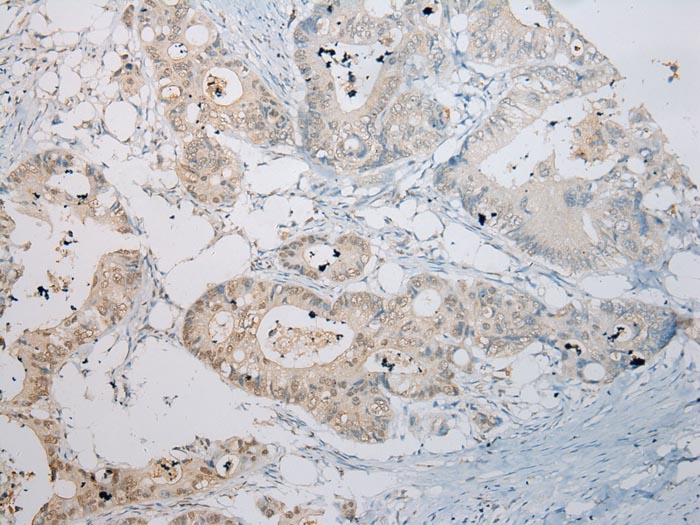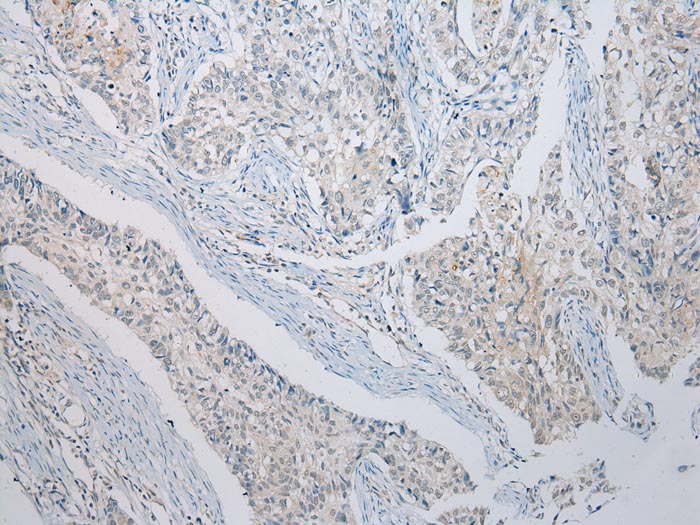

| WB | 咨询技术 | Human,Mouse,Rat |
| IF | 咨询技术 | Human,Mouse,Rat |
| IHC | 1/100-1/200 | Human,Mouse,Rat |
| ICC | 技术咨询 | Human,Mouse,Rat |
| FCM | 咨询技术 | Human,Mouse,Rat |
| Elisa | 咨询技术 | Human,Mouse,Rat |
| Aliases | RASSF5 |
| Host/Isotype | Rabbit IgG |
| Antibody Type | Primary antibody |
| Storage | Store at 4°C short term. Aliquot and store at -20°C long term. Avoid freeze/thaw cycles. |
| Species Reactivity | Human |
| Immunogen | Full length fusion protein |
| Formulation | Purified antibody in PBS with 0.05% sodium azide. |
+ +
以下是关于RASSF3抗体的参考文献示例(注:部分文献信息为示例性概括,建议通过学术数据库核实具体内容):
1. **"RASSF3 suppresses cell proliferation and promotes apoptosis in hepatocellular carcinoma"**
- **作者**: Tommasi, S. et al.
- **摘要**: 本研究通过Western blot和免疫组化分析,发现RASSF3在肝癌组织中表达显著下调。使用特异性RASSF3抗体证实其通过调控p53通路抑制肿瘤细胞增殖并诱导凋亡,提示其作为肿瘤抑制因子的潜在作用。
2. **"RASSF3 modulates DNA damage response via interaction with ATM kinase"**
- **作者**: Shin, Y.K. et al.
- **摘要**: 利用RASSF3抗体进行免疫荧光和共聚焦显微镜观察,发现DNA损伤后RASSF3与ATM激酶共定位增强。研究表明RASSF3通过促进ATM介导的检查点信号传导增强基因组稳定性。
3. **"RASSF3 negatively regulates NF-κB signaling by targeting TRAF2"**
- **作者**: Jung, H. et al.
- **摘要**: 通过免疫共沉淀(使用RASSF3抗体)和报告基因实验,揭示RASSF3与TRAF2直接结合,抑制NF-κB通路的过度激活,为炎症相关疾病提供了新的调控机制。
4. **"Epigenetic silencing of RASSF3 in colorectal cancer involves promoter hypermethylation"**
- **作者**: van der Weyden, L. et al.
- **摘要**: 研究通过ChIP-qPCR(使用RASSF3抗体)和甲基化测序,发现结直肠癌中RASSF3启动子高甲基化导致其表达沉默,恢复RASSF3表达可抑制肿瘤生长。
建议通过PubMed或Google Scholar以“RASSF3 antibody”及相关关键词检索,获取最新及具体文献信息。
The RASSF3 antibody is a research tool used to detect and study the Ras association domain-containing protein 3 (RASSF3), a member of the RASSF tumor suppressor family. RASSF3 is characterized by a conserved Ras association (RA) domain at its N-terminus and a SARAH (Sav-RASSF-Hpo) domain at the C-terminus, facilitating interactions with signaling partners like MST1/2 kinases. It plays roles in regulating cell cycle progression, apoptosis, and genomic stability, primarily through modulating Hippo and p53 pathways. Dysregulation of RASSF3 has been implicated in cancers, where it may act as a tumor suppressor or context-dependent oncoprotein, depending on cellular conditions.
Antibodies targeting RASSF3 enable researchers to investigate its expression, localization, and post-translational modifications (e.g., phosphorylation) in various tissues and disease models. These antibodies are widely used in techniques such as Western blotting, immunoprecipitation, and immunohistochemistry. Species reactivity typically includes human and mouse samples. Notably, RASSF3 antibodies must exhibit high specificity to distinguish between RASSF3 and other RASSF family members (e.g., RASSF1. RASSF5) due to structural similarities.
Current research focuses on clarifying RASSF3's dual roles in cancer, its interactions within stress-response pathways, and potential therapeutic applications. Validated antibodies are critical for advancing studies on its molecular mechanisms and clinical relevance.
×